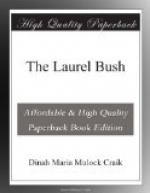She had never heard of him—Robert Roy—never once, in any way, since that Sunday afternoon when he said, “I will write tomorrow,” and did not write, but let her drop from him altogether like a worthless thing. Cruel, somewhat, even to a mere acquaintance—but to her?
Well, all was past and gone, and the tide of years had flowed over it. Whatever it was, a mistake, a misfortune, or a wrong, nobody knew any thing about it. And the wound even was healed, in a sort of a way, and chiefly by the unconscious hands of these little “ministering angels,” who were angels that never hurt her, except by blotting their copy-books or not learning their lessons.
I know it may sound a ridiculous thing that a forlorn governess should be comforted for a lost love by the love of children; but it is true to nature. Women’s lives have successive phases, each following the other in natural gradation—maidenhood, wifehood, motherhood: in not one of which, ordinarily, we regret the one before it, to which it is nevertheless impossible to go back. But Fortune’s life had had none of these, excepting, perhaps, her one six months’ dream of love and spring. That being over, she fell back upon autumn days and autumn pleasures—which are very real pleasures, after all.
As she sat with the two little girls leaning against her lap—they were Indian children, unaccustomed to tenderness, and had already grown very fond of her—there was a look in her face, not at all like an ancient maiden or a governess, but almost motherly. You see the like in the faces of the Virgin Mary, as the old monks used to paint her, quaint, and not always lovely, but never common or coarse, and spiritualized by a look of mingled tenderness and sorrow into something beyond all beauty.
This woman’s face had it, so that people who had known Miss Williams as a girl were astonished to find her, as a middle-aged woman, grown “so good-looking.” To which one of her pupils once answered, naively, “It is because she looks so good.”
But this was after ten years and more. Of the first half of those years the less that is said, the better. She did not live; she merely endured life. Monotony without, a constant aching within—a restless gnawing want, a perpetual expectation, half hope, half fear; no human being could bear all this without being the worse for it, or the better. But the betterness came afterward, not first.
Sometimes her cravings to hear the smallest tidings of him, only if he were alive or dead, grew into such an agony that, had it not been for her entire helplessness in the matter, she might have tried some means of gaining information. But from his sudden change of plans, she was ignorant even of the name of the ship he had sailed by, the firm he had gone to. She could do absolutely nothing, and learn nothing. Here was something like the “Affliction of Margaret,” that poem of Wordsworth’s which, when her little pupils recited it—as they often did—made her ready to sob out loud from the pang of its piteous reality:




